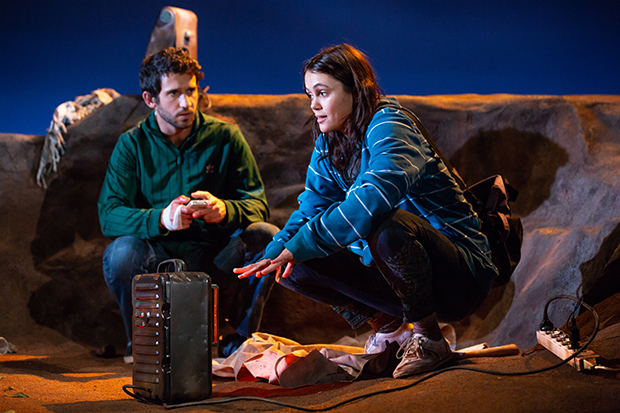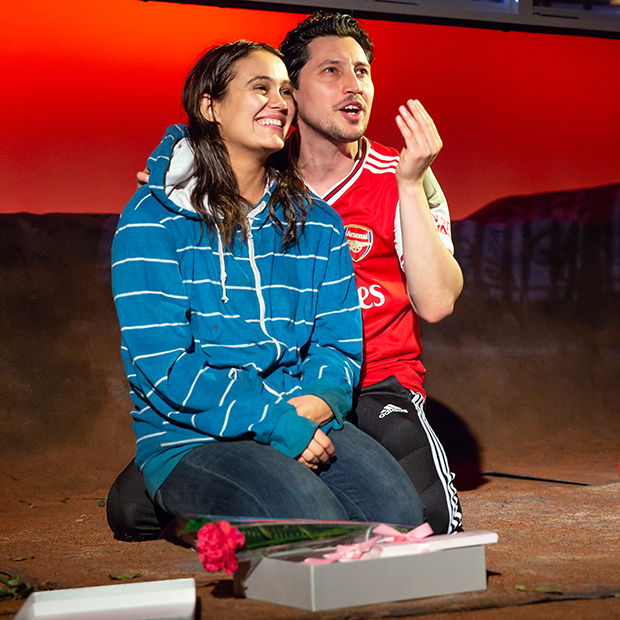In Power Strip, a Syrian Refugee Takes Back What Belongs to Her

(© Jeremy Daniel)
The title ostensibly comes from the long electric cord Yasmin (Dina Shihabi) has extended to a niche in the rock overlooking a Lesbos olive grove. She uses it to power the small space heater that keeps her from freezing at night. She prefers this meager accommodation to the large refugee camp nearby, and it's only temporary: Once she has saved enough money, she plans to pay a smuggler to ferry her to Munich. But when Khaled (Darius Homayoun) comes into her life, she starts to imagine what life might be like with him. She also flashes back to her life in Damascus with Peter (Ali Lopez-Sohaili), the last man she let into her heart. After everything she has been through, a second shot at the romance dances tantalizingly (and menacingly) before her.
Like the two characters in question, we spend a good amount time fantasizing about Yasmin and Khaled and their future lives in Germany. Khoury understands the audience's ingrained cultural desire for such a happy ending, even in militantly individualistic New York City. But Yasmin has fled from a society in which men placed a premium on her virginity, and she sees that Khaled is a product of that society. Now that she is trying to start a new life in Europe, she is not sure if she really has room in her duffel bag for the patriarchy.

(© Jeremy Daniel)
Yasmin crystalizes her predicament in one particularly evocative monologue:
What I don't understand, Khaled.
Is that Damascus fell, didn't it?
I saw it
And the buildings didn't hold up
The concrete, the iron.
But this?
This thin strip between my legs?
This, I was meant to preserve?"
While apologists for Syrian President Bashar al-Assad like Democratic candidate Tulsi Gabbard might retort that Damascus is very much standing and more unified than ever behind the great leader, we get Yasmin's point: Why did we go through all of this turmoil if the world is going to stay exactly the same?
The tension between the individual pursuit of happiness and a life dedicated to family has been a central feature of Western drama since Nora slammed the door on Torvald. Like a number of playwrights (most recently Heather Raffo in Noura), Khoury explores that tension among Middle Eastern refugees carving out lives in the West. Over a century later and in wildly different contexts, Nora's dilemma still makes for gripping drama, especially when it is this well-produced.
Director Tyne Rafaeli endows the stage with a palpable sense of danger, stemming first from Arnulfo Maldonado's rocky set. Fog rolls across the moonlit earth and men lurk in the shadows (uneasy lighting from Jen Schriever). Matt Hubbs underscores key moments with awful notes of tension. The characters bundle up in Dede Ayite's costumes, all of which seem to be a layer too thin to keep them warm. We can practically feel the biting early spring winds coming off the Mediterranean.

(© Jeremy Daniel)
In such a chilly environment, a warm body next to you seems like an invaluable asset, and Khaled is a particularly appealing one as played by the charming Homayoun. Beyond the violence of their characters' initial encounter (or perhaps because of it), Shihabi and Homayoun have genuine chemistry. She stitches up his wound and his eyes light up in recognition of an extraordinary woman. Shihabi delivers a fierce female protagonist who has learned to fight for herself and only lets her guard down when no one is looking. I became emotionally invested in all of these characters (certainly more than the ones in Khoury's last play, Against the Hillside). They are in such a desperate situation, and you want them to find happiness.
But when unyielding tradition bumps up against individual ambition, happiness becomes a zero-sum game. Khoury has a clear perspective on this: No one is going to give you power just because you ask for it. You have to take it. Power Strip peels back the high-minded political discourse to reveal the primal war lurking underneath every conflict.










